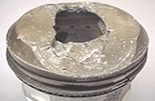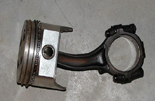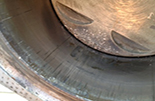Timing
One of the most critical aspects of making your engine run is timing. I can have the proper fuel and air mixture and I can have the most powerful spark man has ever seen, but if I do not get it all to happen at the correct time nothing happens. For the fuel and air mixture to be compressed properly so that it will ignite and burn cleanly (it does not explode, you have issues if that happens, it actually burns in a nice circular fame front)(Learn More about flame speed and such here) (and a cool video of what it looks like)
The timing of the piston and of the cam, which opens and closes the valves is critical. And as we try to develop more power from your engine this becomes more critical. Just putting in a "hot" cam will not necessarily get you more power, it could even send you the wrong way, same with bigger valves) (for a nice overview of a 4 stroke engine and how it works (just about every engine in a car is a 4 stroke engine please click here to see an animated depiction of a 4 stroke engine) As you can see, if you followed the link, the cam and distributor are "timed" together and also "timed" to where the piston is at any moment. At one time this was all a simple mechanical connection. Today, with the advent of computers we can vary the cam ratio and which valve opens when and precisely decide when to fire the ignition system, or to not fire it at all as is done in many engines today to achieve the fuel mileage they do. But no matter, to achieve the best running engine we can, whether for fuel mileage or sheer performance, timing is critical. It always amazes me, even by people who supposed "build" how most people are clueless on how to properly set up a cam. The distributor, or ignition timing, does not change much in today's cars and it actually did not change much in older "points" vehicles. What changed was the points began to wear out and the dwell angle (the amount of time the points are closed) changed, your timing changed. But in an electronic ignition system until something mechanical either wears out or fails timing does not change. Even in the point system, once the points were properly adjusted, unless something mechanically was failing somewhere, bushings in the distributor, timing chain or gears (a notorious Triumph issue) your timing, if correctly set initially will not change.
Setting the correct distributor timing is critical too, to much advance and your engine can overheat, though that can happen with too much retard too. To much advance and we may develop spark knock, where two flame fronts have propagated and run into each other and cause detonation - it can look like this - 
 as we raise compression ratios chasing more power we have to think very carefully how much timing we want and need as it is very easy to put in to much. Retard it to far and you can begin to wash the cylinders out so much that you can score them as gasoline has about no lubricating properties -
as we raise compression ratios chasing more power we have to think very carefully how much timing we want and need as it is very easy to put in to much. Retard it to far and you can begin to wash the cylinders out so much that you can score them as gasoline has about no lubricating properties -  Making it all work is science but making it work just so...
Making it all work is science but making it work just so...
well that requires some magic too - 